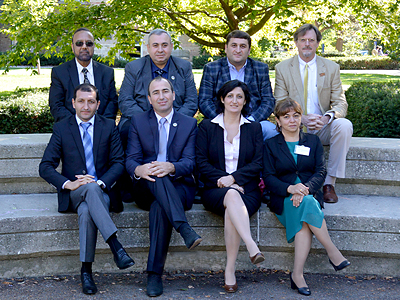
A delegation of community leaders from the Republic of Georgia visited Elmhurst College last week to learn about how religious tolerance is practiced, experienced and fostered in the United States.
The visit, coordinated by the College’s Niebuhr Center for Faith and Action, was part of an eight-day educational and cultural exchange program in which the five delegates were scheduled to visit religiously affiliated schools such as Elmhurst College (which is affiliated with the United Church of Christ), the Islamic Foundation School in Villa Park and Benedictine University (which is Roman Catholic); interfaith and intercultural organizations such as the Parliament of World Religions, Interfaith Youth Core and the Niagara Foundation; the Muslim civil rights group CAIR Chicago; and the Baha’i House of Worship in Wilmette.
During their visit to Elmhurst College, the five-member delegation sat in on Professor Paul Parker’s Religion in America class and adjunct faculty member Inamul Haq’s Contemporary Issues in Islam class. They also attended an Interfaith Dinner & Dialogue event that included students, faculty and staff, and Elmhurst College President S. Alan Ray.
George Palamattam, executive director of the Council of International Programs (CIP) – Chicago, which coordinated the delegates’ trip to the U.S., applauded not only the discussions that took place at Elmhurst but also the opportunity for students to see that such global exchanges are being forged and encouraged.
“Elmhurst is a college that, in its philosophy and practices, is a very inclusive type of institution,” Palamattam said, “so this kind of collaboration between Elmhurst and the CIP is very good. We want to expose the students to this kind of relationship, and for them to know that the highest levels of government sanction these kinds of collaborative opportunities between countries.”
The goal of the program was to enable the delegates to meet with professionals from organizations engaged in or interested in diversity and religious tolerance. During the meetings, discussions revolved around the challenges ethnic minorities and religious groups face, ways to meet those challenges, and ways to promote unity through civic engagement and other educational, cultural and social initiatives. The delegates hoped to learn ways to promote collaboration among different ethnic and religious groups, and to carry back that knowledge to their roles as community leaders in Georgia.
The program, sponsored by the Open World Leadership Center at the Library of Congress, is designed to enhance understanding and capabilities for cooperation between the United States and the countries of Eurasia and the former Soviet Union. The trip was part of an exchange program administered by the Council of International Programs, a nonprofit organization that promotes global understanding through professional development and cultural exchange.